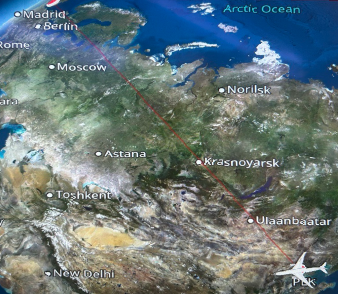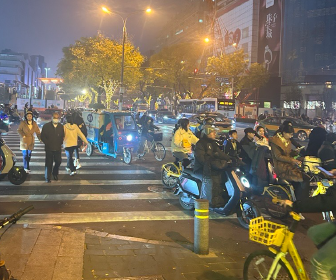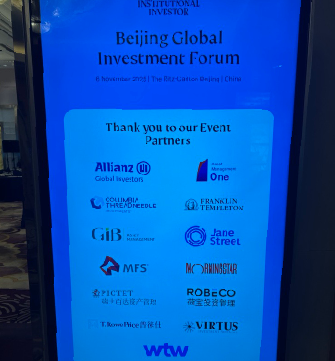
相信 - believe

Ash Dale
Head of Business Development
相信 - believe
The following commentary reflects the personal views and experiences of our Head of Business Development, Ash Dale, during a recent visit to China. It is intended to provide on-the-ground insights and does not constitute investment advice.
相信 - believe
The last time I visited Beijing was pre-Covid 2019, when I was working in Hong Kong for a Chinese fund manager. The state of the economy back then was poor and the outlook worse, and that was before the economic and social ravages of the next few years. I had become that cynical westerner, believing the dream was over, after many years of falling markets and growing doubt over the economy. The changes since are clear; some good, some not. China remains, however, a wonderful land of vibrant culture, lovely people, relentless determination, ruthless leadership and fascinating contradictions. Indeed, flying from London with Air China meant we could fly over Russia without threat, in an American airplane, propelled by (probably) Russian fuel. Who says globalisation is dead?

Arriving in Beijing, the smog certainly hadn’t changed; thick and yellow, visibility around 200 metres - the old and the weak advised to ‘stay indoors’. Clearly, industrial output and the coal-fired plants are cranked up to ‘max’, in part and somewhat ironically, to fuel the ‘clean’ electric vehicle revolution, now so dominant that traffic noise is merely a whispering hum. Cars, mopeds, bikes, buses; walking through the city is like watching a film with the volume turned down, although the jams are as bad as ever and there are still an extraordinary number of mopeds darting, silently, about, nimbly avoiding the pedestrians and each other. The lack of foreign tourists is also obvious; I felt I was the only gweilo in the city, but the locals are as pleasant as ever; helpful, polite and somewhat pitying all at once. Stopping at a cool new Italian-style coffee shop, I could only pay with Alipay, which I didn’t have of course, so they kindly gave it to me for nothing (I returned the next day and paid with cash, in case you were wondering).

The AI revolution is also clear to see and is being used to keep public order - a vast electronic billboard, 10 stories high, close to Tiananmen Square projects a decorated young military officer, looking sternly down upon the people, slowly turning his gaze upon all, while lecturing about national pride and loyalty to the Party. A strange dystopian vision of Big Brother in control, projected by a futuristic technology of which Orwell could only have dreamed. Further on, there is no way to the Square thanks to a police and military presence stationed at every street corner and crossing, with random on the spot checks of people and vehicles. The Party is uber-present, more visible and threatening than I have seen in 30 years of travelling there. This is the consequence of recent economic malaise and simmering unrest post Covid. We have seen how this can bubble over, but for now, all appears relatively calm, on the outside at least.
The participants at the Institutional Investor conference I attended were a predominantly young, mixed audience of very smart, articulate, bi-lingual (thank goodness!) finance professionals. Any similar conference in the West would be made up primarily of people like me; grey, middle-aged, dull, male. So much for the looming ageing demographic problem - it doesn’t appear, here at least, that China will ‘get old before it gets rich’. In fact, most questions put to me, as one of very few Westerners, were along the lines of “What exactly is happening in the UK?”. There appears to be bemusement, not schadenfreude, at the perceived demise of the UK and, to a degree, the West overall. As one person said, “A strong West means a strong East”. I just told people not to believe everything they read in the press! A lesson we could also learn.

Indeed, the lack of fellow-Westerners was very striking, not least because it indicates how few have returned and, while the stock markets in both China and HK have had a spectacular recovery so far this year, international asset allocators have mostly not participated. After all, it was only a few months ago when the same ‘experts’ were insisting that China is broken, finished as a single country asset class, and should be excluded from Global, Emerging Markets and, even, Asian funds - talk about picking the market lows. A grand reversal in performance is under way, so expect international funds to load up after missing the first 30%. Plus ça change. Besides, the Chinese domestic stock market has never relied on foreign capital, which still owns less than 5% overall (vs 6.4% in 2021 and 30-40% in Korea and Taiwan). The Party is doing all it can to spur asset prices, to keep the population happy and unrest at bay, especially after the recent property crash. National service, according to a senior figure at CIC, is only going to continue, with Govt funds stepping in to buy large caps and ETFs upon any signs of weakness. This may be a dangerous game as it encourages unhealthy speculation (although leverage is low) but positive momentum is palpable and, while many are unusually but healthily sceptical, the stock market is still under-owned and the rally is set to continue for the foreseeable future.
I was there to judge whether there is opportunity for the international funds we are distributing, as well as if there are new opportunities to pursue and products to create. The Government funds are most bullish equities as an asset class, with China (of course!), Emerging Markets (equity and debt) and Japan (surprisingly) the three clear winners, although they are more sophisticated than ever before and demand tailored products to satisfy their demands. Wealth managers are becoming far more advanced too, with multiple products and asset classes compared to only a few years ago and growing demand for international exposure via QDII and the various Hong Kong / Greater Bay connects. The connection with firms from the Gulf region, such as GIB, is strengthening too as China looks towards the Middle East and other ‘global south’ markets to build and strengthen political ties and business lines, through mutual trust and a similar mindset built on self-reliance, determination, a can-do spirit and freedom from the West.
I am looking forward to returning, with renewed optimism. One can read any amount of bullish broker reports on the market, but ultimately it is the people and their behaviour that dictates future trends, and you need to be there, on-the-ground to really feel that optimism. China believes in itself again and that is a good sign for any foreign investor looking to return.
This content should not be construed as advice for investment in any product or security mentioned. Examples of stocks are provided for general information only to demonstrate our investment philosophy. Observations and views of GIB AM may change at any time without notice. Information and opinions presented in this document have been obtained or derived from sources believed by GIB AM to be reliable, but GIB AM makes no representation of their accuracy or completeness. GIB AM accepts no liability for loss arising from the use of this presentation. Moreover, any investment or service to which this content may relate will not be made available by GIB to retail customers.
